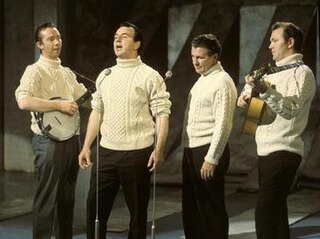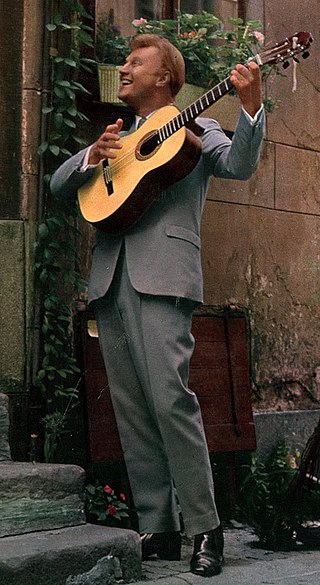Related Research Articles
Salli C. Terri was a singer, arranger, recording artist, and composer. Record audiences still cite Terri's "haunting" vocals, with Hi-Fi Review originally describing her as "a mezzo soprano whose velvet voice and astonishing flexibility has hardly an equal at present."
John Coburn Stewart was an American songwriter and singer. He is known for his contributions to the American folk music movement of the 1960s while with the Kingston Trio (1961–1967) and as a popular music songwriter of the Monkees' No. 1 hit "Daydream Believer" and his own No. 5 hit "Gold" during a solo career spanning 40 years that included almost four dozen albums and more than 600 recorded songs.

Ian & Sylvia were a Canadian folk and country music duo which consisted of Ian and Sylvia Tyson. They began performing together in 1959, married in 1964, and divorced and stopped performing together in 1975.

The Clancy Brothers were an influential Irish folk music group that developed initially as a part of the American folk music revival. Most popular during the 1960s, they were famed for their Aran jumpers and are widely credited with popularising Irish traditional music in the United States and revitalising it in Ireland, contributing to an Irish folk boom with groups like the Dubliners and the Wolfe Tones.

Liam Clancy was an Irish folk singer from Carrick-on-Suir, County Tipperary. He was the youngest member of the influential folk group the Clancy Brothers, regarded as Ireland's first pop stars. They achieved global sales of millions and appeared in sold-out concerts at such prominent venues as Carnegie Hall and the Royal Albert Hall.

The New Christy Minstrels are an American large-ensemble folk music group founded by Randy Sparks in 1961. The group has recorded more than 20 albums and scored several hits, including "Green, Green", "Saturday Night", "Today", "Denver" and "This Land Is Your Land". The group's 1962 debut album, Presenting the New Christy Minstrels, won a Grammy Award and remained on the Billboard 200 albums chart for two years.

Robert Stead Gimby, OC was a Canadian orchestra leader, trumpeter, and singer-songwriter.
John Beckwith was a Canadian composer, writer, pianist, teacher, and university administrator.

Eve Goldberg is a folk musician, singer and songwriter based in Toronto, Ontario, Canada. Musically, she draws from a number of different traditions and influences such as blues, country, bluegrass, jazz, swing, and contemporary and traditional folk music.

"Michael, Row the Boat Ashore" is a traditional African-American spiritual first noted during the American Civil War at St. Helena Island, one of the Sea Islands of South Carolina. The best-known recording was released in 1960 by the U.S. folk band The Highwaymen; that version briefly reached number-one hit status as a single.
Camp Naivelt is a left-wing secular Jewish camping community in Brampton, Ontario, founded in 1925 as a children's summer camp, Camp Kinderland. It is affiliated with the United Jewish People's Order.

"Where Have All the Flowers Gone?" is a folk song written by American singer-songwriter Pete Seeger in 1955. Inspired lyrically by the traditional Cossack folk song "Koloda-Duda", Seeger borrowed an Irish melody for the music, and published the first three verses in Sing Out! magazine. Additional verses were added in May 1960 by Joe Hickerson, who turned it into a circular song. Its rhetorical "where?" and meditation on death place the song in the ubi sunt tradition. In 2010, the New Statesman listed it as one of the "Top 20 Political Songs".

Robert Joseph 'Bobby' Clancy Jr was an Irish singer and musician best known as a member of The Clancy Brothers, one of the most successful and influential Irish folk groups. He accompanied his songs on five-string banjo, guitar, bodhrán, and harmonica.

Marg Osburne was a Canadian country, folk and gospel singer. She was a recipient (posthumously) of the ECMA Stompin' Tom Connors award.

Oscar Brand was a Canadian-born American folk singer-songwriter, radio host, and author. In his career, spanning 70 years, he composed at least 300 songs and released nearly 100 albums, among them Canadian and American patriotic songs. Brand's music ran the gamut from novelty songs to serious social commentary and spanned a number of genres.
The Raftsmen was a Canadian folk music group, active through the 1960s, which performed Canadian and traditional folk songs. They collectively played 15 different instruments, including guitar, banjo and percussion, and sang songs in 13 languages.

Patriotic music in Canada dates back over 200 years as a distinct category from British or French patriotism, preceding the first legal steps to independence by over 50 years. The earliest, "The Bold Canadian", was written in 1812.
The Abbey Tavern Singers are an Irish vocal group who had a major hit in Canada and a minor hit in the United States in 1966 with "We're off to Dublin in the Green".

William Clauson was a Swedish-American singer of folk songs from various nations, including some of the songs of Carl Michael Bellman in both English and Swedish.

Sharon, Lois & Bram are a Canadian children's music group founded in Toronto, Ontario, 1978. The group's original lineup consisted of Sharon Hampson, Lois Ada Lilienstein, and Bramwell "Bram" Morrison.